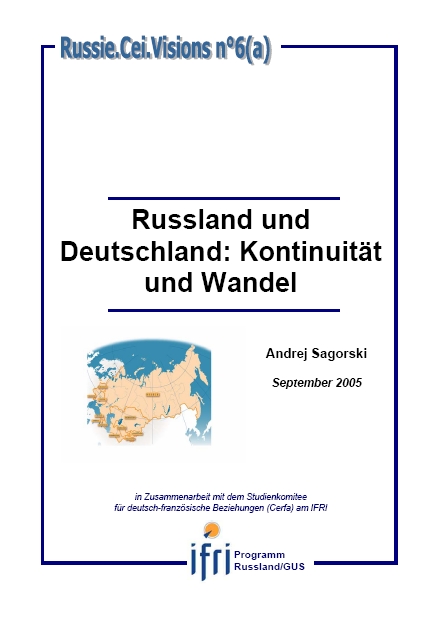Russland und Deutschland: Kontinuität und Wandel

Double Note du Cerfa, in cooperation with the Programm Russia/NEI
Note du Cerfa, 26 (a), September 2005 Hannes Adomeit, "Germany's Russian policy: the end of the "honeymoon"?"
Note du Cerfa, 26 (b), September 2005 Andreï Zagorski, "Russia and Germany: continuity and changes"
Over the past six years, a subdivided though very centralised mecanism for Russian-German cooperation has been forming. This mecanism has enabled many issues within bilateral relations to be resolved, but at the same time contributed to growing alienation between officiel attitudes and the mood in civil society in both countries. The "Schröder-Poutin era" in Russian-German relations is coming to end, and it stands to reason that the new government will make changes. However, these are likely to affect the style, and not the substance of relations with Russia.
Andrei Zagorsky, Deputy Director of the Moscow branch of the Konrad Adenauer Foundation.
Download the full analysis
This page contains only a summary of our work. If you would like to have access to all the information from our research on the subject, you can download the full version in PDF format.
Russland und Deutschland: Kontinuität und Wandel
Related centers and programs
Discover our other research centers and programsFind out more
Discover all our analyses
Securing critical raw material (CRM) value chains – a prerequisite for Europe’s technological resilience
At the heart of economic security, technological resilience is a backbone of the European Union’s (EU) competitiveness. The EU’s energy and digital transitions depend on critical raw materials (CRM).

Reconciling competitiveness and demographic change: a Franco-German imperative
France and Germany are facing parallel demographic shifts that could reshape the future of their economies and their social models. These shifts reflect broader European patterns but are magnified by the central role both nations play in EU governance and competitiveness.
Taking the Pulse: Does France's Political Crisis Weaken Europe's Geopolitical Hand?
While the EU tries to navigate a myriad international challenges, France is experiencing historic political disarray. What impact will instability in Paris have on Europe's geostrategic capacity?
Imaginary and Reality of the Franco-German border: a Laboratory for Europe of tomorrow
In Europe, the question of borders is a central issue. According to the European Parliament, border regions cover around 40% of the European Union (EU) territory, concentrate 30% of its population and produce nearly a third of its gross domestic product.








